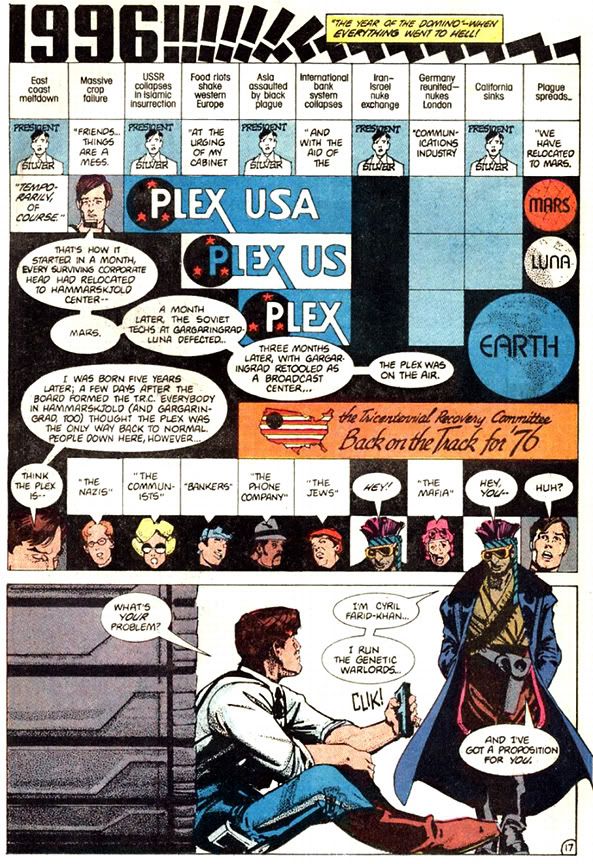 Any useful idea about the future should appear to be ridiculous.
Any useful idea about the future should appear to be ridiculous.-Jim Dator
Howard Chaykin’s American Flagg was a cutting edge comic for its time. It incorporated a lot of storytelling techniques later borrowed by any number of creators. The use of television screen iconography and pop culture references to provide depth, to amplify and make ironic comment on the action would later serve Frank Miller very well indeed in his acclaimed series The Dark Knight Returns. Thanks to letterer Ken Bruzenak, who served almost as a co-illustrator, Flagg incorporated text and graphic design into the art in creative and original ways, although it can be argued Will Eisner (his Spirit title splashes) and Jim Steranko and Bruzenak (on Marvel's FOOM magazine) did some of the earlier experimentation along these lines. All that’s well and good. Very good indeed.
“Forget all that crap! What about American Flagg’s success as a work of futurology?” you ask. "How accurate are its predictions?"
Well, I’m glad you asked me that particular question because it's been on my mind lately. Futurology is fun for me because I’m a dork. And as a dork, I especially love it when we actually reach the era described in a futurological work and we can see just how accurate or not the author’s predictions were. Just for kicks, because Howard Chaykin probably intended American Flagg to be entertaining first and foremost, not a visionary work of hardcore speculation.
Because that would be stupid. So let’s be stupid. All two or three of us. Together. Being stupid is much more enjoyable in a group. Let’s examine American Flagg as an attempt to predict the future.
Chaykin makes it easy on us because unlike Nostradamus and his poetic vagaries that could mean damn well anything, he provides us with a specific date. 1996, called by Flagg himself “The Year of the Domino.” An anno horribilis. What happened to make it so?
In American Flagg, actor Reuben Flagg (obsoleted former star of Mark Thrust: Sexus Ranger, which seems like something that could've aired on late-night Showtime, Cinemax or even the old USA Network) comes to Earth from Mars to join the Plex Rangers. As a newcomer, he’s the perfect fictional vehicle for Chaykin to describe his futuristic setting. In the first issue, after he’s learned a bit about the PlexMall and the current state of America, Flagg sits down and records a diary entry where he tells how this all came about.
Get your scorecards ready! And… here… we… go:
 East coast meltdown. Some sort of nuclear accident. In 1983, when First Comics published American Flagg, the 1979 Three Mile Island incident was still fairly recent news. That was also the year Columbia Pictures released the Jane Fonda/Jack Lemmon/Michael Douglas thriller The China Syndrome. So nuclear safety was a controversial topic around that time. But we didn't have a major nuclear catastrophe in America in 1996, or any major accident in the years since Three Mile Island. The Soviet Union, yeah, and it happened a mere 3 years after American Flagg's premiere. You should read up on the Chernobyl Exclusion Zone. Fascinating stuff. I'll bet if Chernobyl had happened before he started American Flagg, Chaykin would've incorporated something along those lines.
East coast meltdown. Some sort of nuclear accident. In 1983, when First Comics published American Flagg, the 1979 Three Mile Island incident was still fairly recent news. That was also the year Columbia Pictures released the Jane Fonda/Jack Lemmon/Michael Douglas thriller The China Syndrome. So nuclear safety was a controversial topic around that time. But we didn't have a major nuclear catastrophe in America in 1996, or any major accident in the years since Three Mile Island. The Soviet Union, yeah, and it happened a mere 3 years after American Flagg's premiere. You should read up on the Chernobyl Exclusion Zone. Fascinating stuff. I'll bet if Chernobyl had happened before he started American Flagg, Chaykin would've incorporated something along those lines.
Massive crop failure. Nope, didn’t happen in 1996 and ideally modern growing techniques will keep us in food for the indefinite future. Have we had even a minor crop failure recently? Florida oranges? Georgia peaches? Oh the shifting fortunes of those dependent on the weather.
USSR collapses in Islamic insurrection. Now we’re getting somewhere. The USSR collapsed, only it happened in 1991, 5 years earlier than Chaykin's prediction. The same decade! That's at least as accurate as any TV psychic, right up there with that woman who predicted all the Kennedy assassinations. And even though the Soviet Union's downfall wasn't due to an Islamic insurrection, don’t forget the Soviet defeat in Afghanistan was still 5 years away when this comic debuted. Ultimately, the closest analog to Chaykin's prediction was the horrific First Chechen War, a Muslim separatist conflict which lasted from 1994 to 1996. Huh? Huh? Unfortunately for futurology-accuracy's sake, that was a post-Soviet conflict and the region remains a Russian federal subject. Still, coming that close to the correct collapse date trumps any causal considerations so I have to give Mr. Chaykin a lot of credit for this one. And also for his correct reading of some of the internal regional religio-political strains underlying the external image of Soviet solidarity. I mean, around the same time, Mike Baron and Steve Rude had a Soviet Union still existing 500 years into the future in Nexus!
Food riots shake Western Europe. Not even close. Although French farmer Jose Bove has led protests against McDonald's. Does that count?
International bank system collapses. Nope.
Iran-Israel nuclear exchange. This one is scarily prescient. It still hasn’t happened but recent events make it seem all too likely; Mr. Chaykin may merely have the date a decade or two too early. What’s amazing is that it’s specifically Iran, and not say, Syria or Jordan or some made up Trans-Arabic Alliance. But then again, likelihood isn’t actuality. So any points will have to be deferred for now.
Germany reunited, nukes London. This one is, I think, a little bit of a joke. Mr. Chaykin having a little fun. West and East Germany reunified in 1990, but throughout the rest of the decade they seemed pretty peaceful. Certainly not out for any revenge. Being a mere six years off on the political half of this 2-part event practically qualifies Chaykin as a full-fledged psychic. I also remember a David Letterman Top 10 List on France's jittery preparations for German reunification. Close enough. So partial credit for historical accuracy, partial credit for anticipating a Letterman joke.
California sinks. Physically or metaphorically? Hasn't happened. And may not unless Paris Hilton relocates there. I’ve always been skeptical about this whole notion of California “falling into the sea.” Small islands have blown themselves apart volcanically, and yes, I’ve heard practically my entire life that the Big One will one day drop California into the Pacific. But since California is anchored to a land mass and not floating on top of the water, I’m not sure what the geological mechanics of such an event would entail. Is there some sort of continental shelf drop-off directly off the California shoreline where an earthquake could tumble the entire state into the sea?
Plague spreads. What plague? A plague of annoying smart-ass comic book blogs? If so, well done, Mr. Chaykin! You were only off a few years. Other than that I don’t recall any world-shaking pandemics in 1996.
The U.S. government and major corporations relocate to Mars. Sounds like a good idea to me, but it didn’t happen.
H.G. Wells and Jules Verne tend to get high marks for some of their futurological fictions, while the Star Trek series’ background details seem more irrelevant all the time as we sweep past important dates without Eugenics Wars and WWIII. My favorite sci-fi film series, Planet of the Apes, is getting increasingly ridiculous. There were no faster-than-light interstellar launches in 1973 and where's our 1991 dog and cat plague? What if the world doesn't end in 3955 or 3978? See? Those crazy futurological fools couldn't even keep their years straight!
George Orwell meant his 1984 more as metaphor and criticism than prediction, but that didn’t stop pundits from giving it a thorough workout when that year actually rolled around. Arthur C. Clarke and Stanley Kubrick hung a specific date on their famous space odyssey, but 2001 didn’t see any monoliths excavated on the moon, or artificial intelligences going slowly psychotic in transit to Jupiter.
Actually, that last one is interesting too because it predicts defunct airline Pan Am would one day deliver space-tourists and government scientists to giant rotating space stations that haven't yet materialized and we also now know Velcro-bottomed shoes have yet to come into style for our many thousands of dedicated space flight attendants who must serve microwaved chicken and beef meals in zero gravity.
So, to answer your original question. Is Howard Chaykin the visionary equal to Verne, Wells and Clarke? Is American Flagg a startlingly prescient work of futurology? What the hell do I know? In 1983, I was a junior high kid at the time and mostly into comic books and video games. My idea of 1996 was I'd be a rock star making the fabulous sum of $30,000 a year and living in a space dome with Paulina Porizkova on the dark side of the moon. So basically, I have no idea. Sorry I wasted your time!
NOTE: In our next installment, we’ll examine the futurology of Reuben Flagg’s hyper-violent, hyper-sexualized world of 2030 and see what’s already come to pass and what seems to have been made less likely thanks to various developments in the years between 1983 and now. You know… if I get around to finishing the damned thing.

No comments:
Post a Comment